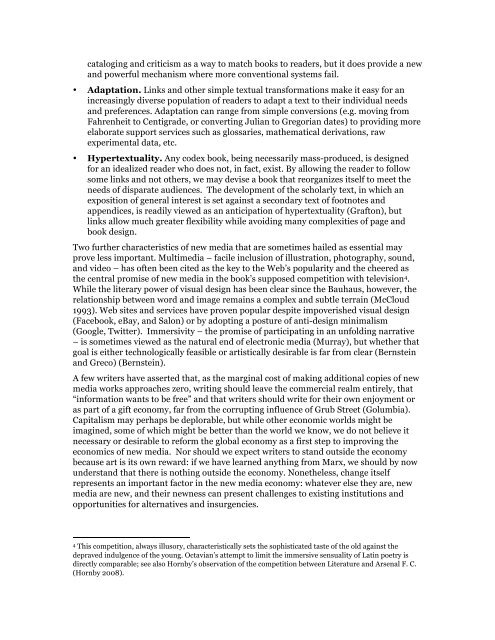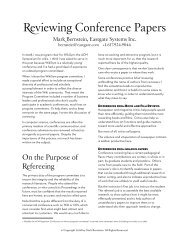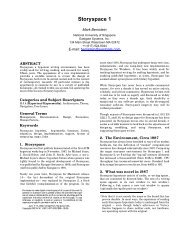Genre: Designing a New Media Economy - Mark Bernstein
Genre: Designing a New Media Economy - Mark Bernstein
Genre: Designing a New Media Economy - Mark Bernstein
You also want an ePaper? Increase the reach of your titles
YUMPU automatically turns print PDFs into web optimized ePapers that Google loves.
cataloging and criticism as a way to match books to readers, but it does provide a newand powerful mechanism where more conventional systems fail.• Adaptation. Links and other simple textual transformations make it easy for anincreasingly diverse population of readers to adapt a text to their individual needsand preferences. Adaptation can range from simple conversions (e.g. moving fromFahrenheit to Centigrade, or converting Julian to Gregorian dates) to providing moreelaborate support services such as glossaries, mathematical derivations, rawexperimental data, etc.• Hypertextuality. Any codex book, being necessarily mass-produced, is designedfor an idealized reader who does not, in fact, exist. By allowing the reader to followsome links and not others, we may devise a book that reorganizes itself to meet theneeds of disparate audiences. The development of the scholarly text, in which anexposition of general interest is set against a secondary text of footnotes andappendices, is readily viewed as an anticipation of hypertextuality (Grafton), butlinks allow much greater flexibility while avoiding many complexities of page andbook design.Two further characteristics of new media that are sometimes hailed as essential mayprove less important. Multimedia – facile inclusion of illustration, photography, sound,and video – has often been cited as the key to the Web’s popularity and the cheered asthe central promise of new media in the book’s supposed competition with television 4 .While the literary power of visual design has been clear since the Bauhaus, however, therelationship between word and image remains a complex and subtle terrain (McCloud1993). Web sites and services have proven popular despite impoverished visual design(Facebook, eBay, and Salon) or by adopting a posture of anti-design minimalism(Google, Twitter). Immersivity – the promise of participating in an unfolding narrative– is sometimes viewed as the natural end of electronic media (Murray), but whether thatgoal is either technologically feasible or artistically desirable is far from clear (<strong>Bernstein</strong>and Greco) (<strong>Bernstein</strong>).A few writers have asserted that, as the marginal cost of making additional copies of newmedia works approaches zero, writing should leave the commercial realm entirely, that“information wants to be free” and that writers should write for their own enjoyment oras part of a gift economy, far from the corrupting influence of Grub Street (Golumbia).Capitalism may perhaps be deplorable, but while other economic worlds might beimagined, some of which might be better than the world we know, we do not believe itnecessary or desirable to reform the global economy as a first step to improving theeconomics of new media. Nor should we expect writers to stand outside the economybecause art is its own reward: if we have learned anything from Marx, we should by nowunderstand that there is nothing outside the economy. Nonetheless, change itselfrepresents an important factor in the new media economy: whatever else they are, newmedia are new, and their newness can present challenges to existing institutions andopportunities for alternatives and insurgencies.4This competition, always illusory, characteristically sets the sophisticated taste of the old against thedepraved indulgence of the young. Octavian’s attempt to limit the immersive sensuality of Latin poetry isdirectly comparable; see also Hornby’s observation of the competition between Literature and Arsenal F. C.(Hornby 2008).




